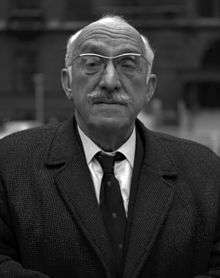Marcus Lipton

Marcus Lipton CBE (29 October 1900 – 22 February 1978) was a British Labour Party politician.[1][2]
The son of Benjamin and Mary Lipton of Sunderland, he was educated at Hudson Road Council School and Bede Grammar School in the town, before winning a scholarship to Merton College, Oxford in 1919.[1][2][3] He was supported by a Worshipful Company of Goldsmiths exhibition bursary.[1] He graduated with a Second in Modern History in 1922 and then studied law and was called to the bar at Gray's Inn in 1926.[1][3]
Career
Lipton first entered politics in 1928 when he contested the London County Council elections as Liberal Party candidate for the Stepney division of Mile End. In 1934 he was elected to Stepney Borough Council.[1] He became an alderman of Lambeth Metropolitan Borough Council in 1937 serving until 1959.[1][2] Shortly before the outbreak of the Second World War, Lipton enlisted as a private in a Territorial Army unit of the Royal Army Pay Corps.[1][2][3] He was commissioned as an officer in the Army Educational Corps in 1941, rising to Lieutenant-Colonel by the end of the conflict in 1945.[1][2][3]
He was elected as the Member of Parliament (MP) for Brixton in the 1945 general election, defeating the sitting Conservative Party MP Nigel Colman. He retained the seat at each subsequent election until it was abolished at the February 1974 general election.[2] He was subsequently elected as MP for the successor seat of Lambeth Central, remaining in the Commons until his death.[1][2]
Parliamentary questions
Lipton was an active parliamentarian, known for putting topical and difficult questions to the executive.[1] He used parliamentary privilege to question Prime Minister Anthony Eden about the alleged Third Man, Kim Philby. Philby used the press and the law to force Lipton to withdraw his comments, although Philby was subsequently unmasked as a Soviet spy. In 1964 Lipton brought up the case of the missing Lionel Crabb, again using parliamentary privilege.[4]
After a CIA pilot flying in support of the 1954 Guatemalan coup d'état deliberately napalmed and destroyed the British cargo ship SS Springfjord, Lipton pursued successive Conservative and Labour Foreign Secretaries for the next 13 years over the UK's failure to obtain any compensation for the attack.[5][6][7][8]
Criticism of pop music
As a man of an entirely different generation, Lipton in his last years was often critical of the form the pop and rock music industries had developed by the 1970s. On 2 June 1975, he attacked the "mass hysteria deliberately created by the promoters of pop concerts" following scenes at Bay City Rollers shows. Later, in response to the Sex Pistols' criticism of the British Royal Family, he argued that "if pop music is going to be used to destroy our established institutions, then it must be destroyed first".
Despite this controversy, or perhaps because of it, he released a record himself, "Hand In Hand"/"Friends In Need", on the Butterfly record label. It was not a chart hit.[9]
Honours and legacy
In 1949 he was created an OBE, advanced to a CBE in 1965.[1][2] In 1974 he was made an honorary freeman of the London Borough of Lambeth.[1][2] In January 1978 he announced he would not run for parliament again. He collapsed at his home in Holborn, London on 20 February 1978 and died two days later in Westminster Hospital.[10][11]
A youth centre in Lambeth is named after him. He gave a tour of Parliament to a 13-year-old constituent in the 1950s, John Major, sparking a political ambition that led Major to becoming Conservative Prime Minister.[12]
References
- 1 2 3 4 5 6 7 8 9 10 11 12 "Obituary: Mr Marcus Lipton MP". The Times. 23 February 1978. p. 18.
- 1 2 3 4 5 6 7 8 9 "LIPTON, Marcus". Who Was Who. Oxford University Press. December 2007. Retrieved 16 December 2011.
- 1 2 3 4 Levens, R.G.C., ed. (1964). Merton College Register 1900-1964. Oxford: Basil Blackwell. p. 117.
- ↑ Welham, Jacqui (2010). The Crabb Enigma. Troubador Publishing Ltd. pp. 118–119. ISBN 1848763824.
- ↑ Anthony Eden, Secretary of State for Foreign Affairs (8 November 1954). "Guatemala (S.S. "Springfjord")". Parliamentary Debates (Hansard). United Kingdom: Commons. col. 846–847. Retrieved 16 August 2012.
- ↑ Robin Turton, Under-Secretary of State for Foreign Affairs (8 December 1954). "Bombed British Steamer (Compensation Claim)". Parliamentary Debates (Hansard). United Kingdom: Commons. col. 933. Retrieved 16 August 2012.
- ↑ Robert Allan (10 February 1960). "Guatemala (S.S. Springfjord)". Parliamentary Debates (Hansard). United Kingdom: Commons. col. 457–458. Retrieved 16 August 2012.
- ↑ William Rodgers (12 June 1967). "Guatemala (Bombing of S.S. "Springfjord")". Parliamentary Debates (Hansard). United Kingdom: Commons. col. 15W. Retrieved 16 August 2012.
- ↑ "Marcus Lipton CBE, MP And Friends - Hand In Hand / Friends In Need". 45cat.com. 2016. Retrieved 22 February 2016.
- ↑ "MP collapses". The Times. 22 February 1978. p. 2.
- ↑ "MP dies after collapse at his home". The Times. 23 February 1978. p. 1.
- ↑ Renton, Alex (26 August 1993). "Vision of Britain". The Independent. London. Retrieved 12 March 2011.
Sources
- The Times House of Commons 1955. The Times. 1955.
- Leigh Rayment's Historical List of MPs
External links
- Hansard 1803–2005: contributions in Parliament by Marcus Lipton
| Parliament of the United Kingdom | ||
|---|---|---|
| Preceded by Nigel Colman |
Member of Parliament for Brixton 1945–Feb 1974 |
Constituency abolished |
| New constituency | Member of Parliament for Lambeth Central Feb 1974–1978 |
Succeeded by John Tilley |